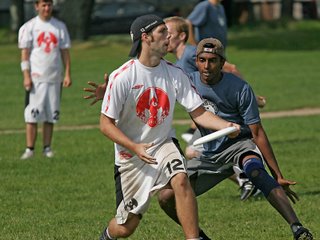FOUL!!
There is an increasing trend towards very aggressive, physical (read: fouls galore) marking these days. A less experienced player can become very flustered by this, and he will usually throw as a result of the pressure. Even worse, a lot of times these players don't know to call "foul". Against a more experienced thrower, however, fouling marks are sweets treats, indeed. Why? Because it gives you a free throw. a foul upon releasing the throw is either completed (in which case you "play on") or it is incomplete and the disc comes back to the thrower-- ie, it's a free throw). Here are a few scenarios to consider...
1. you receive a pass and your marker decides to bodycheck you as he initiates stall couting .
in this case, i'll generally NOT call the foul. why? because calling a foul here stops the play and can ruin any flow that the cutters may have (this is often the reason that some players bump into their marks- because it kills the offensive flow). there is also no benefit to calling "foul" in terms of lowering the stall count, as it is only at 1 or 2 by this point. if you fall from the contact, or the contact ruins your chances of throwing for the next 2 or 3 seconds, then call the foul so you can reset. otherwise, ignore the contact and continue looking for the best throw.
2. your marker is grinding you like an axe (ie, there is either consistent or repeated points of contact between you and your marker).
when your mark is doing this, you should try and take the free throw by throwing through the contact and call "foul" upon releasing the disc (if complete, say "play on"-- if not, it comes back to you). *caveat* if you call the foul before you initiate the throw, then don't throw it. if you do throw after calling foul, then (if completed) it comes back to you -or- (if incomplete) it is a turn-over.
3. your marker chops your hand when you are releasing the disc (ie, before the disc has left your hand).
this is easy. call a foul everytime you feel contact on the release.
calling "foul" is something that doesn't come naturally. oftentimes the thrower may not realize he has been fouled until after the play has finished (ie, when pumped up, contact often goes unnoticed). as such, it is important to incorporate fouls (over-aggressive marks) into some of your drills so players can practice making the foul call.
kirk.
Photo: Inian Moorthy marking up vs. Phoenix at Cdn.Nationals in Halifax 2006. (note to reader: this was not a fouling mark)
1. you receive a pass and your marker decides to bodycheck you as he initiates stall couting .
in this case, i'll generally NOT call the foul. why? because calling a foul here stops the play and can ruin any flow that the cutters may have (this is often the reason that some players bump into their marks- because it kills the offensive flow). there is also no benefit to calling "foul" in terms of lowering the stall count, as it is only at 1 or 2 by this point. if you fall from the contact, or the contact ruins your chances of throwing for the next 2 or 3 seconds, then call the foul so you can reset. otherwise, ignore the contact and continue looking for the best throw.

2. your marker is grinding you like an axe (ie, there is either consistent or repeated points of contact between you and your marker).
when your mark is doing this, you should try and take the free throw by throwing through the contact and call "foul" upon releasing the disc (if complete, say "play on"-- if not, it comes back to you). *caveat* if you call the foul before you initiate the throw, then don't throw it. if you do throw after calling foul, then (if completed) it comes back to you -or- (if incomplete) it is a turn-over.
3. your marker chops your hand when you are releasing the disc (ie, before the disc has left your hand).
this is easy. call a foul everytime you feel contact on the release.
calling "foul" is something that doesn't come naturally. oftentimes the thrower may not realize he has been fouled until after the play has finished (ie, when pumped up, contact often goes unnoticed). as such, it is important to incorporate fouls (over-aggressive marks) into some of your drills so players can practice making the foul call.
kirk.
Photo: Inian Moorthy marking up vs. Phoenix at Cdn.Nationals in Halifax 2006. (note to reader: this was not a fouling mark)


0 Comments:
Post a Comment
<< Home